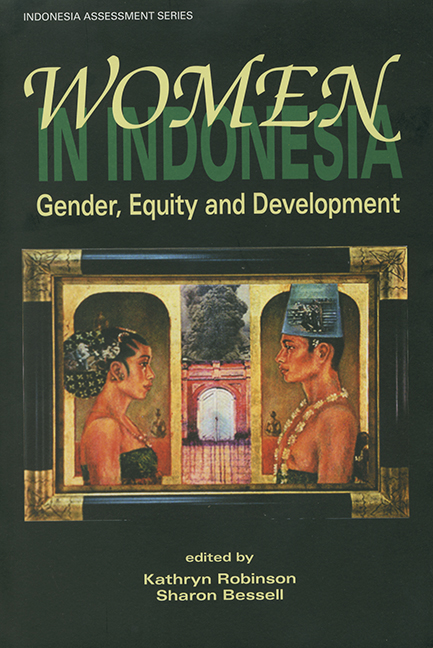Book contents
- Frontmatter
- Contents
- Tables
- Figures
- Contributors
- Acknowledgments
- Glossary
- Prologue
- 1 Introduction to the Issues
- 2 The Mega Factor in Indonesian Politics: A New President or a New Kind of Presidency?
- 3 The Downfall of President Abdurrahman Wahid: A Return to Authoritarianism?
- 4 The Year in Review: From Blind Man's Bluff to Mega Expectations
- 5 Further Comments on the Economy, with a Gender Perspective
- 6 Institution Building: An Effort to Improve Indonesian Women's Role and Status
- Commentary
- 7 Feminism in Indonesia in an International Context
- 8 Gay and Lesbi Subjectivities, National Belonging and the New Indonesia
- 9 And the Winner Is … Indonesian Women in Public Life
- 10 Indonesian Women Artists: Transcending Compliance
- 11 Literature, Mythology and Regime Change: Some Observations on Recent Indonesian Women's Writing
- 12 Women and the Labour Market during and after the Crisis
- 13 Women's International Labour Migration
- 14 Customary Institutions, Syariah Law and the Marginalisation of Indonesian Women
- 15 Women's Grassroots Movements in Indonesia: A Case Study of the PKK and Islamic Women's Organisations
- 16 Women's Activism against Violence in South Sulawesi
- 17 Gender Mainstreaming and Sex-disaggregated Data
- 18 The Changing Indonesian Household
- 19 Women, Family Planning and Decentralisation: New Variations on Old Themes
- 20 Men, Women and Community Development in East Nusa Tenggara
- References
- Index
- INDONESIA ASSESSMENT SERIES
19 - Women, Family Planning and Decentralisation: New Variations on Old Themes
Published online by Cambridge University Press: 21 October 2015
- Frontmatter
- Contents
- Tables
- Figures
- Contributors
- Acknowledgments
- Glossary
- Prologue
- 1 Introduction to the Issues
- 2 The Mega Factor in Indonesian Politics: A New President or a New Kind of Presidency?
- 3 The Downfall of President Abdurrahman Wahid: A Return to Authoritarianism?
- 4 The Year in Review: From Blind Man's Bluff to Mega Expectations
- 5 Further Comments on the Economy, with a Gender Perspective
- 6 Institution Building: An Effort to Improve Indonesian Women's Role and Status
- Commentary
- 7 Feminism in Indonesia in an International Context
- 8 Gay and Lesbi Subjectivities, National Belonging and the New Indonesia
- 9 And the Winner Is … Indonesian Women in Public Life
- 10 Indonesian Women Artists: Transcending Compliance
- 11 Literature, Mythology and Regime Change: Some Observations on Recent Indonesian Women's Writing
- 12 Women and the Labour Market during and after the Crisis
- 13 Women's International Labour Migration
- 14 Customary Institutions, Syariah Law and the Marginalisation of Indonesian Women
- 15 Women's Grassroots Movements in Indonesia: A Case Study of the PKK and Islamic Women's Organisations
- 16 Women's Activism against Violence in South Sulawesi
- 17 Gender Mainstreaming and Sex-disaggregated Data
- 18 The Changing Indonesian Household
- 19 Women, Family Planning and Decentralisation: New Variations on Old Themes
- 20 Men, Women and Community Development in East Nusa Tenggara
- References
- Index
- INDONESIA ASSESSMENT SERIES
Summary
FAMILY PLANNING IN 1998
If asked to name the New Order program that had the largest impact on Indonesian women, schooling, primary health care and employment generation might all come to mind, but without doubt the national family planning program would eclipse each of these in terms of the proportion of the population affected, the magnitude of the social change involved and the anticipated degree of difficulty faced at the outset of the program.
By 1998 the three decades of development under the New Order regime of Soeharto had produced a family planning program that stood as a model for the developing world. More than contraception, the program promoted income-generating activities, integrated health posts (Posyandu), small credit schemes, and community organisations to cater for the various needs of infants, adolescents and the elderly. By 1992 the National Family Planning Coordination Agency (BKKBN) had motivated sufficient commitment in political circles to develop a basic law on family welfare – UU10/1992. This symbolised a change in the organisation's mandate from population control to the promotion of a broad range of family welfare activities.
By the time the International Conference on Population and Development met in Cairo in 1994, the reputation of the Indonesian program had grown to the status of a model for other developing countries, and a matter of great pride nationally. Haryono Suyono, the chief architect of the family planning mass communications strategies used to overcome resistance and reticence in the nation, had been rewarded for his efforts with a dual appointment as Minister of Population and chief of the BKKBN. From this perspective he could see the need both to promote the story of Indonesia's success in international forums, and to protect the program from growing criticism that its strategies and style were authoritarian. He proclaimed a commitment to quality of care in March 1993 while at the same time moving the core mission of the BKKBN from the coordination of family planning services to the promotion of family welfare and poverty alleviation.
In fact this was not a major shift in rationale; from its outset in 1968 the family planning program had contextualised its activities as welfare (kesejahteraan). The difference lay not in the terms, but in the underlying focus and activities.
- Type
- Chapter
- Information
- Women in IndonesiaGender, Equity and Development, pp. 235 - 249Publisher: ISEAS–Yusof Ishak InstitutePrint publication year: 2002



